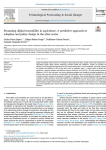Parra-López C., Reina-Usuga L., Garcia-Garcia G., Carmona-Torres C. (2025). Promoting digital traceability in agriculture: a predictive approach to adoption and policy design in the olive sector. Technological Forecasting and Social Change, 01/06/2025, vol. 215, p. 124077.
https://doi.org/10.1016/j.techfore.2025.124077
https://doi.org/10.1016/j.techfore.2025.124077
| Titre : | Promoting digital traceability in agriculture: a predictive approach to adoption and policy design in the olive sector (2025) |
| Auteurs : | C. Parra-López ; L. Reina-Usuga ; G. Garcia-Garcia ; C. Carmona-Torres |
| Type de document : | Article |
| Dans : | Technological Forecasting and Social Change (vol. 215, Juin 2025) |
| Article en page(s) : | p. 124077 |
| Langues : | Anglais |
| Langues du résumé : | Anglais |
| Catégories : |
Catégories principales 08 - ALIMENTATION ; 8.4 - Hygiène des Aliments. Sécurité SanitaireThésaurus IAMM AGRICULTURE ; TRACABILITE ; CONTROLE DE QUALITE ; INNOCUITE DES PRODUITS ALIMENTAIRES ; OLEICULTURE ; ESPAGNE |
| Résumé : | Digital traceability systems (DTS) are essential for improving food safety, quality control and transparency in agricultural supply chains, thereby enhancing consumer health and confidence. Despite its potential, the adoption of DTS in traditional agricultural sectors remains limited due to several challenges. This study examines the adoption and diffusion of DTS in the olive sector in Andalusia, Spain - a region critical to global olive production - using the Adoption and Diffusion Outcome Prediction Tool (ADOPT). The study predicts moderate diffusion of DTS in the long term. Key factors influencing adoption are identified, including profitability, enterprise scale, ease and convenience, existing skills and knowledge, and the evaluability and complexity of DTS. A number of policy measures are proposed to increase DTS adoption. These include financial incentives, support strategies for large enterprises, technology simplification, highlighting environmental benefits, risk management initiatives, skills development and training, and strengthening advisory services. This research contributes to the understanding of digital transformation in agriculture, especially in traditional agricultural sectors. It highlights the need for adaptable policy frameworks that take into account the different needs of farmers and technological advances. |
| Cote : | Réservé lecteur CIHEAM |
| URL / DOI : | https://doi.org/10.1016/j.techfore.2025.124077 |







